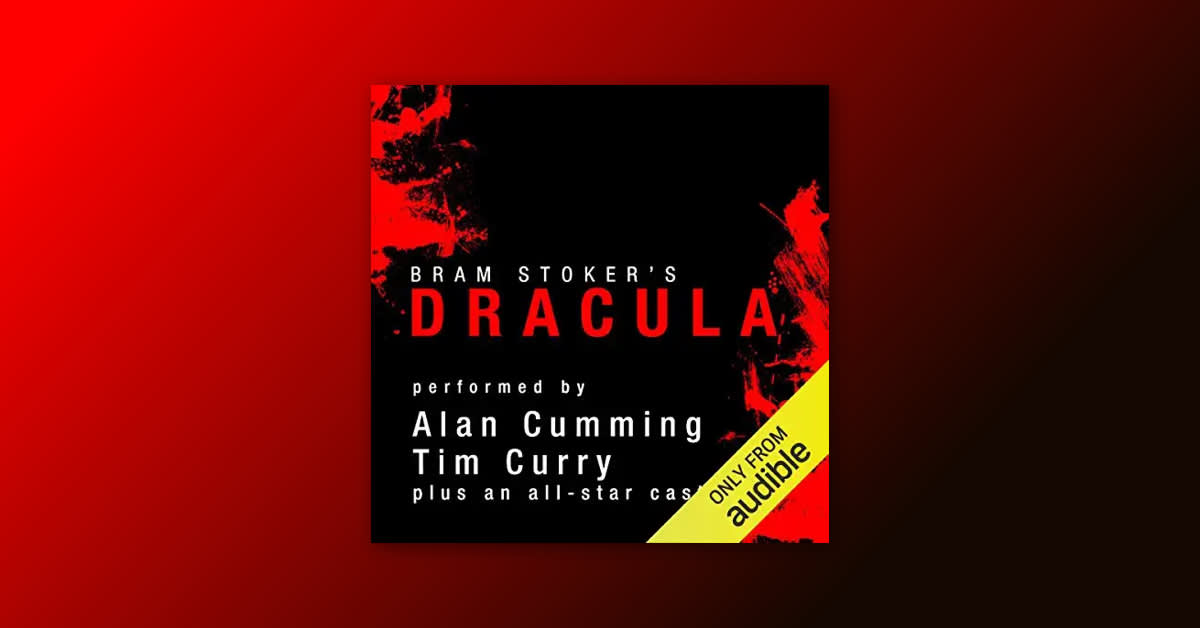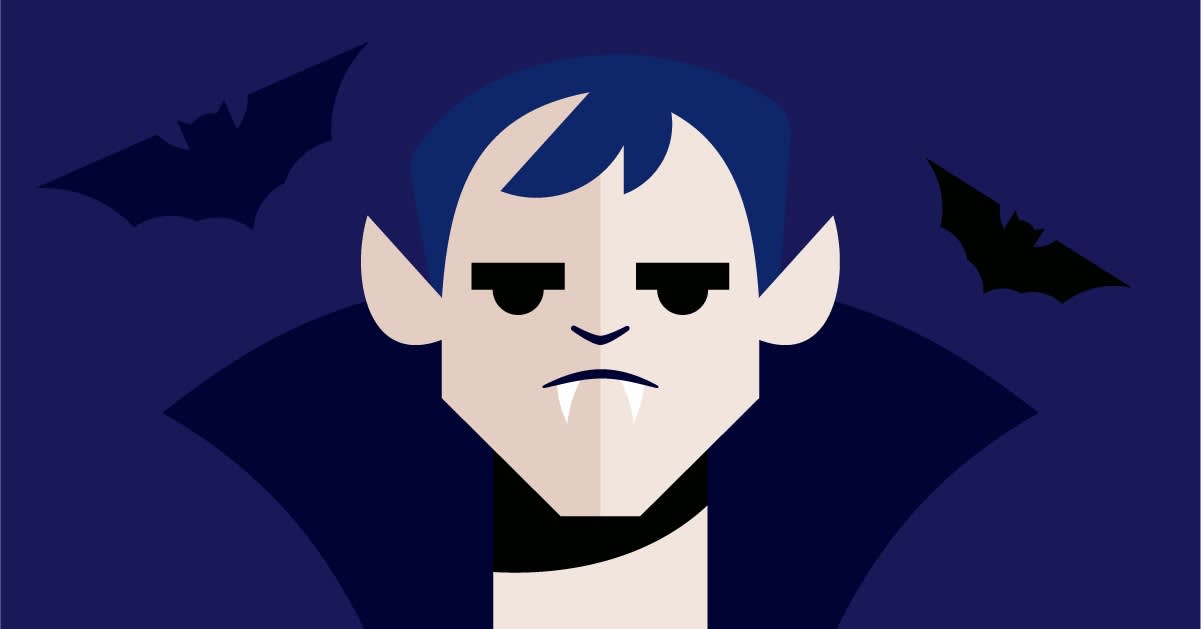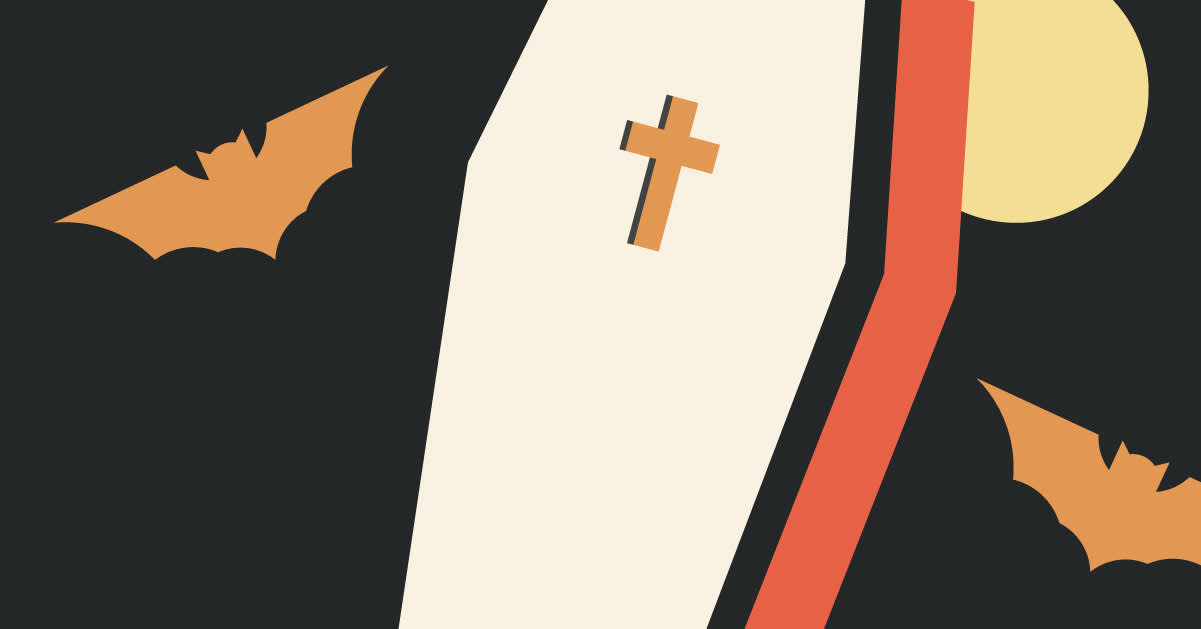This Friday, April 14, a new spin on the vampire classic hits theaters with the arrival of Renfield, a horror comedy starring Nicholas Hoult, Awkwafina, Ben Schwartz, and Nicholas Cage that follows the exploits of Dracula’s familiar, R.M. Renfield. Renfield was first introduced in Bram Stoker’s 1897 pillar of Gothic horror, so if you don’t quite recall the specifics, now is the perfect time to get reacquainted with the history of the Count.
Bram Stoker’s Dracula has remained an important part of popular culture and literary history since its 19th-century debut. While the Transylvanian villain was not the first fictional bloodsucker, the character has nonetheless become practically synonymous with vampires. After all, if you’re to picture the creation, you’ll likely conjure up an image of a pallid, mysterious, fanged man living in a castle and donning a dark cape.
But Dracula has also had a number of makeovers on screens both big and small. Renfield is just the latest film to pay homage to the most famous vampire in history, but cinema has a long history with this classic horror novel. With more than 200 adaptations and reimaginings of Dracula, it can be difficult to know where to get started. Never fear—our list of must-watch Dracula adaptations will satisfy any vampire lover’s thirst for Gothic drama.
Nosferatu (1922)
Nosferatu is a silent German Expressionist horror film starring Max Schreck and directed by F.W. Murnau. Though often associated with Dracula, it was actually an unofficial adaptation of the source material, and as such, key details in the original were changed to avoid copyright infringement. For one, Count Dracula's name was changed to Count Orlok; still, many details of the story remain the same. The movie follows Count Orlok, played by Schreck, as he preys on the wife of an estate agent and brings terror and death to their town. Notably, this 1922 film was the first media to depict vampires dying when exposed to sunlight, which subsequently became a staple of vampire lore.
Dracula (1931)
This 1931 movie marks the first film adaptation of Bram Stoker's novel with sound. Dracula stars Bela Lugosi, who had previously played the role of the Count on Broadway. Along with winning critical acclaim, this film was a commercial success for Universal Studios, and its popularity was a major factor in cementing Dracula as a prominent character in popular culture to this day. Lugosi's Dracula led to several sequels and spin-offs, including Dracula's Daughter, Son of Dracula, and many more.
Dracula's Daughter (1936)
On the topic of sequels, Dracula's Daughter was the first direct follow-up to the highly successful 1931 film. It tells the story of Countess Marya Zaleska, the vampiric daughter of Count Dracula. The inspiration for the film is open to speculation. Some cite a deleted chapter from Bram Stoker's original novel, which was later published as the short story entitled "Dracula's Guest,” even though the movie bears no resemblance to its supposed source material. Others credit the classic vampire story Carmilla by Joseph Sheridan Le Fanu, which, like Dracula's Daughter, includes lesbian themes. Anne Rice would later name Dracula's Daughter as an influence for her own homoerotic vampire fiction.
Dracula (1958)
Following the success of Universal's Dracula franchise came 1958's Dracula, the first in the series of Hammer Horror films starring Christopher Lee as Count Dracula. Compared to 1931's vision of the Count, Christopher Lee's Dracula offered a sexier version of the character, introducing the idea that there was something sensual about a bite upon the neck. This adaptation was a huge hit and launched a new era of Dracula films, including The Brides of Dracula, Dracula: Prince of Darkness, and several others.
Dracula A.D. 1972 (1972)
One of the later films in the Hammer Dracula film franchise, Dracula A.D. 1972 is notable for the way it brought the popular vampire character into contemporary times. In this film, Dracula, still played by Christopher Lee, is brought back to life in 1972 London, where he sets out to hunt down the descendant of his nemesis, Van Helsing. This was the sixth film to star Christopher Lee in the titular role.
Bram Stoker's Dracula (1992)
Bram Stoker's Dracula was written and directed by Francis Ford Coppola and stars Gary Oldman as Count Dracula, Anthony Hopkins as Van Helsing, Winona Ryder as Mina Harker, and Keanu Reeves as Jonathan Harker. Despite some concerns about Keanu Reeve's performance and English accent, the film received mostly positive reviews and is the only Dracula film to win Academy Awards. The movie is also notable for what it added to the vampire genre, reinventing old tropes and creating new ones, successfully reintroducing the cinematic vampire to contemporary audiences.
Dracula: Dead and Loving It (1995)
In response to Bram Stoker's Dracula came Dracula: Dead and Loving It, a parody of the 1992 film directed by Mel Brooks and starring Leslie Nielsen as Dracula. While the film obviously takes comedic liberties, many of the plot points do follow the source material closely. Though the film received negative critical reviews, it remains a cult classic among comedy fans.
Dracula 2000 (2000)
Horror legend Wes Craven's Dracula 2000 is another film that takes the character of Dracula and moves him into a modern age. Like Dracula A.D. 1972 before it, Dracula 2000 sees Bram Stoker's character resurrected—this time in New Orleans, Louisiana, at the dawn of a new millennium—and hunting down a descendant of Van Helsing. Despite being considered a commercial failure, Dracula 2000 was followed by two direct-to-video sequels, Ascension in 2003 and Legacy in 2005.
Van Helsing (2004)
Van Helsing is an action horror film starring Hugh Jackman as Dutch monster hunter Gabriel Van Helsing. This film version of Van Helsing has little to do with the character Abraham Van Helsing from Bram Stoker's original novel. Rather, 2004's Van Helsing took greater inspiration from Universal’s classic monster horror films, including their series of Dracula adaptations and spin-offs, and many non-vampiric creatures, including werewolves and Frankenstein’s monster.
Hotel Transylvania (2012)
In 2012, Dracula got a lot more animated. The Sony Pictures Animation film Hotel Transylvania imagines what would happen if Count Dracula turned his castle into a hotel for the world's monsters to hide away from human civilization. Unsurprisingly, the Dracula of this film is a lighter, gentler, and more welcoming version of the horrifying vampire we've come to know from other film franchises. The 2012 film was loved by audiences young and old, and there have been three sequels to date.
Dracula (2013–2014)
In 2013, Dracula got a notable television series adaptation. The series aired for one season and 10 episodes, from October 25, 2013 to January 24, 2014. While the Dracula TV series revives many familiar characters, the series merely references plot points and details in the original Dracula novel. This story sees Dracula, played by Jonathan Rhys Meyers, revived by Van Helsing, portrayed by Thomas Kretschmann. Both men are seeking revenge, and so they form an uneasy alliance. Meanwhile, Dracula is drawn to a woman named Jessica De Gouw’s Mina Murray, who seems to be a reincarnation of Dracula's wife, Ilona.
Dracula (2020)
Dracula was adapted into another television series in 2020, this time with BBC Sherlock’s Mark Gatiss and Stephen Moffatt at the helm. The limited series follows Dracula, played by Claes Bang, from his origins in Eastern Europe to contemporary England. "The Rules of the Beast," the first episode of the three-part series, bears some resemblance to Bram Stoker's original novel. However, the series began to deviate more and more from the source material as it went on. One notable change is in the character of Van Helsing, who in this adaptation is a nun named Agatha Van Helsing. In contemporary England, Dracula meets Dr. Zoe Van Helsing, a descendant of Agatha's. The Dracula series was met with generally positive reviews, and Gatiss and Moffatt have considered making a second season.
Renfield (2023)
Mark your calendars: Renfield, directed by Chris McKay, is arriving imminently. As it’s from Universal Pictures, the very same studio that practically created the monster genre, you can expect this film will play homage to the studio’s Dracula film franchise. From the trailer, however, we can see that some details of the character of Renfield ring true to the original character in Bram Stoker's Dracula. After all, he eats flies and seems beholden to the whims of his master, Dracula. We’ll find out definitively when the movie comes out on April 14.




